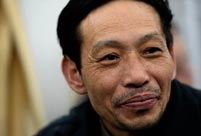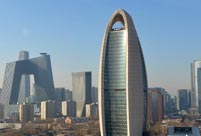 Int'l Snow Sculpture Art Expo in Harbin
Int'l Snow Sculpture Art Expo in Harbin Sichuan money wall for dividend payment
Sichuan money wall for dividend payment Li Na crashes Belinda Bencic in 2nd round at Australian Open
Li Na crashes Belinda Bencic in 2nd round at Australian Open
 Shocking moments when PLA's weapons open fire
Shocking moments when PLA's weapons open fire Famous Lanzhou beef noodles
Famous Lanzhou beef noodles Armed Police hold anti-terrorism drill in SE China's Xiamen
Armed Police hold anti-terrorism drill in SE China's Xiamen Harbin Int'l Ice and Snow Festival opens
Harbin Int'l Ice and Snow Festival opens 'Jin' named the word of the year by cross-strait netizens
'Jin' named the word of the year by cross-strait netizens Chinese scientific expedition goes to build new Antarctica station
Chinese scientific expedition goes to build new Antarctica station
Korean Peninsula: Positive interaction is critical
There were new uncertainties in the domestic affairs of both the Democratic People's Republic of Korea (DPRK) and South Korea in 2013, which may have a negative impact on foreign polices and bilateral relations.
Public support for South Korean President Park Geun-hye dipped from 70 percent at the beginning of taking office to 40 percent at the end of 2013. Failure to achieve the goal of economic reform is the direct cause of the drop in her approval ratings. In addition, questions about the presidential electoral process and the ongoing struggle between the ruling and opposition parties also have lowered Park's support rate.
Analysts believe South Korea will further tighten its policy toward the DPRK so as to transfer pressure off the ruling party.
At the same time, positive interaction between the DPRK and South Korea remains. In terms of Park's performance evaluation in 2013, relations with the DPRK rated relatively high. In the face of an extremely difficult situation, Park has not given up on the "trust process" based on dialogue, an approach that is considered by the public both to adhere to the right principles and to help in stabilizing the situation.
Furthermore, Park visited Pyongyang before she came to power and was able to reach a consensus with former DPRK leader Kim Jong Il. From her experiences and beliefs, we can expect that she will continue to seek openings in north-south relations in her future policies.


 A 60-hour journey home
A 60-hour journey home Int'l Snow Sculpture Art Expo
Int'l Snow Sculpture Art Expo Highlights of China's air force
Highlights of China's air force Airline crew stage flashmob dance at Kunming airport
Airline crew stage flashmob dance at Kunming airport Top15 countries to retire to in 2014
Top15 countries to retire to in 2014 Hot supermodel's new photo album released
Hot supermodel's new photo album released Asia's heaviest box girder finishes 'rotation' in Wuhan
Asia's heaviest box girder finishes 'rotation' in Wuhan Completed facade of People's Daily new headquarters
Completed facade of People's Daily new headquarters Chinese-branded car passes North America standard safety test for the first time
Chinese-branded car passes North America standard safety test for the first time Li Na beats Bouchard to reach Australian final
Li Na beats Bouchard to reach Australian final  Explore the sources of PM 2.5
Explore the sources of PM 2.5 Highlights of Chinese airborne troops'exercises
Highlights of Chinese airborne troops'exercises  'Living in ice house' competition held in central China
'Living in ice house' competition held in central China  Chinese figure in Oscar nominations
Chinese figure in Oscar nominations  Top ten aerospace events in China 2013
Top ten aerospace events in China 2013Day|Week|Month